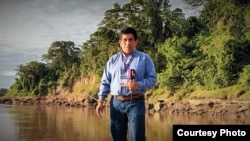A Peruvian journalist who covers illegal gold mining in the La Pampa region has been speaking out about the threats he receives over his reporting.
For more than 10 years, Manuel Calloquispe Flores has covered tensions between local government and groups involved in illegal gold mining in the region, as well as political and social issues in the Peruvian region of Madre de Dios. The journalist works for media outlets including Latina television, El Comercio and Inforegion Peru.
In a call with VOA on Friday, Calloquispe recalled how a group of people tried to intimidate him while he was on assignment in July. At the time, the journalist was accompanying a group from National Geographic to the Interoceanic Highway near La Pampa.
"A group of people showed up where I was working, people I identified in an article I wrote a few days back. I had never seen them before, but I could tell it was them because I saw their identification cards while investigating and writing the story," he told VOA. "They didn't say anything to me, but they wanted me to know they were there."
The story Calloquispe had published was on the killing of a police officer at the Interoceanic Highway. In that investigation, he identified a possible criminal group.
Covering criminal elements linked to environmental issues in that region is a line of reporting that has brought repeated risks for Calloquispe.
In January, Calloquispe was reporting live on TV about a protest in Madre de Dios when a crowd gathered, making hostile remarks about the press and pointing out where he lived.
Calloquispe described that incident in an interview with the "Latina Noticias" telecast, recalling how he was warned to leave.
"Minutes later I received a call by the Ministry of Interior telling me that I had to go as fast as I could to the nearest police station," Calloquispe said. He and his son, who works as his cameraman, left quickly.
The International Federation of Journalists said that after the incident in January, Calloquispe stayed for a few weeks in Lima while tensions eased.
Media organizations say that Calloquispe is a rare voice in reporting on the exploitation of natural habitat in the Amazon and how illegal gold mining among criminal groups brings poverty, human trafficking and sexual exploitation of women.
Zuliana Lainez, head of the National Association of Journalists of Peru, said in a statement, "With Manuel, one of the things that I fear the most is that when he has to leave Madre de Dios, we will probably lose the only voice that dares to speak of organized crime, about the mafias and what is happening in Madre de Dios. And that's sad, because in the end you see local journalism totally gagged."
Other journalists also have commended his work.
"What struck me about Manuel is that he is one of the few journalists in the region strongly opposed to the industry," Ricardo Leon, weekend editor at El Comercio, said during an interview with the Committee to Protect Journalists.
For now, when Calloquispe experiences threats or publishes a sensitive story, he leaves his home for a couple of weeks, as a safety measure. But he has said he plans to save up to buy protective equipment and a pistol.
"I was born here; I grew up in this forest and saw what it was like," he told VOA. "I have seen how it has changed, but what has affected my life the most is that I have seen innocent people who come here looking for an opportunity to work and they become criminals. I have seen how entire families get killed, innocent people."
That is why, Calloquispe said, he will keep reporting despite the threats. "I know I have to keep doing this," he said. "I'm the only one who can do it."




